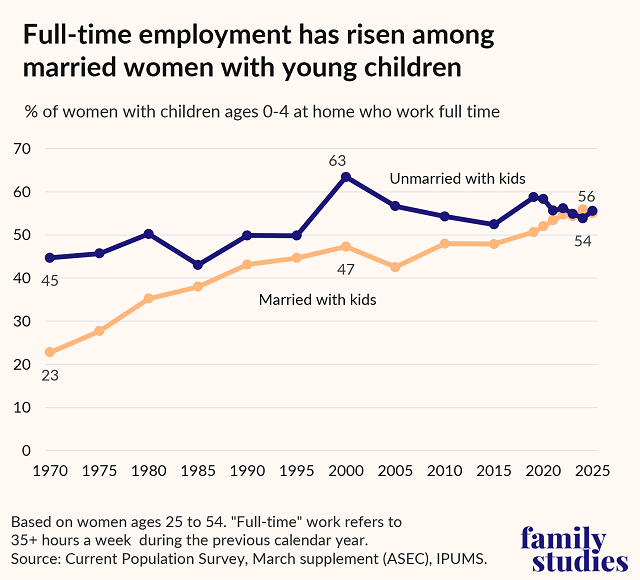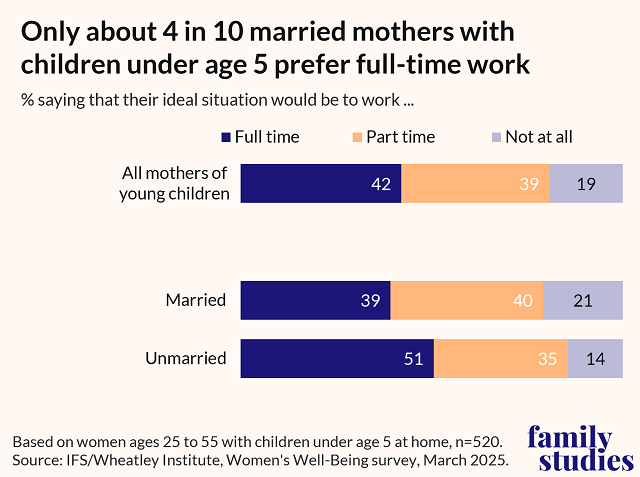Highlights
- College-educated mothers, in particular, desire greater work flexibility, while less educated mothers are more interested in tax credits or cash benefits. Post This
- “Costs associated with raising a family” rank as the top issue most families (70%) say they face today, up from just half of families in 2015. Post This
- Married mothers of young children today are working more than they want to be. Post This
- The preference for full-time employment among more educated moms is not driven exclusively by financial need but rather by opportunity costs, and likely a sense of identity and meaning tied to work. Post This
The work and family landscape for women is changing. After rising sharply across the 1970s through the 1990s, the “revolution” in women’s labor force participation appeared to stall for the next two decades. That “stall” reflected a persistent preference among married mothers, especially those with young children, to pull back from full-time employment. Marriage offered them the choice to not be employed full time especially when their children were young, while unmarried mothers did not have that option.
Lisa Belkin’s 2003 New York Times piece, “The Opt-Out Revolution” ignited a cultural conversation by chronicling the number of married educated mothers who opted out of careers and delayed employment until their children were older or chose part-time positions that afforded them more “satisfaction, balance, and sanity.”
By 2012, Pew research found that only half of the mothers working full time wanted to be. Most preferred part-time employment. For married mothers, only 23% considered full-time employment to be their ideal. In contrast, nearly half of unmarried mothers preferred full-time employment. Predictably, mothers with lower family incomes were more likely to want full-time employment, while those with higher family incomes preferred part-time or no employment.
Today, mothers with children under age 5, traditionally the group least likely to be in the workforce, have seen the strongest increase in their employment rates, per a new IFS report.
In the years since, things have shifted, changes that were masked by the apparent “stall” in women’s employment. In 2024, for the first time since data have been recorded, married mothers with young children are more likely than unmarried mothers to be working full time for pay—56% versus 54%, per a new IFS report released today. Mothers with children under age 5, traditionally the group least likely to be in the workforce, have seen the strongest increase in their employment rates. This increase is largely driven by married mothers of young children, specifically in increased rates of full-time employment, though married mothers of school-age children have also increased their full-time employment rates. In contrast, full-time employment has dropped among mothers of young children who are unmarried.

Why Are More Married Moms of Young Children Working Today?
What is driving this change? As described in our new IFS report, married mothers are not working more because their husbands are working less. Married fathers have maintained very high rates of full-time employment across the decades.
Economics, however, do appear to play a role. “The costs associated with raising a family” ranks as the top issue most families (70%) say they face today, up from just half of families in 2015. Some of this perception is shaped by a greater consumption and an increased standard of living due over the last 50 years. At the same time, with the recent rise of inflation, the real wage (adjusted for inflation) for American workers has gone down. A dual income feels like a necessity for many families today.
Prophetically, it seems, there may be something to Elizabeth Warren and her daughter Amelia Tyagi’s description of the “Two-Income Trap.” As married mothers entered the work force, couples had more money to spend, setting off a bidding war in real estate while they lost the division of labor benefits of a homemaker. And as a result, families actually ended up feeling more strapped financially than before the rise in two incomes.
In fact, married mothers of young children today are working more than they want to be, another key finding from our new report. Though 56% are working full-time, only 39% of married mothers with pre-school age children want to be. Part-time employment is what married mothers of young children prefer most, but it also appears hard to attain. Only 30% of mothers who prefer part-time employment are doing so in reality.

But the shift in full-time employment among mothers of young children is also a demographic issue. Married mothers of young children are twice as likely today (52%) to have a college degree than their unmarried counterparts (25%). Having a college degree is linked with a preference for full-time employment. Married mothers who do not have a college degree are much less likely to prefer full-time employment than married mothers with a college degree. Nobel Laureate Claudia Goldin’s conclusion about more educated women’s work preferences seems to be clearly at play here – the more educated you are, the more you have to give up in choosing not to be employed. That reality may also explain another sharp deviation from the past, mothers with a higher family income are more likely to prefer full-time employment than mothers with a lower family income.
Clearly, the preference for full-time employment among more educated mothers is not driven exclusively by financial need, but by opportunity costs, and likely a sense of identity and meaning tied to employment for college-educated mothers. Mothers without a college degree have less to gain through employment. And as our report indicates, more than two-thirds of unmarried mothers with children under age 5 today receive welfare benefits compared to 45% in 2000.
Part-time employment is what married mothers of young children prefer most, but it also appears hard to attain.
Policy Matters
Do these changes in mothers’ employment patterns and preferences matter when it comes to policy? As this IFS report finds, working mothers do want more support—specifically in paid family leave, increased work flexibility, and child tax credits. College-educated mothers, in particular, desire greater work flexibility, while less educated mothers are more interested in tax credits or cash benefits.
At the same time, mothers are less interested in government sponsored day care. And, in fact, based on the latest research, wariness about universal day care is warranted. Many parents actually want more access to part-time work options, and flexible work arrangements that allow them to work out the care of their own children.
The landscape of working women does appear to be shifting. These changes, including an increased preference for full-time employment especially among college-educated married mothers with children at home, seems to reflect the genuine desires and interest of many families. But it is also true that many of these families would choose differently if they could.
A close look at women’s desires reveals a substantial gap in both their preference for part-time work over full-time work, and a general desire for more children than they are having. At the same time, we have seen a dramatic drop in the marriage rate, especially among working class women. What we seem to have ended up with was well described by Ross Douthat some years ago, “a lot of dual-earner couples [who still feel they are financially strapped] but fewer successful relationships and fewer children than either sex desires.”
A more robust economy always benefits mothers, making it more likely that they can choose what they feel is best for their families without the anxiety of providing the necessities that many feel today. We would also do well to increase access to part-time employment options and increase mothers access to work flexibility. At the same time mothers who do not have a college degree look different. These mothers would likely benefit from access to tax credits and direct benefits, as well as greater educational opportunities.
Understanding why more moms are working full time today matters: Mothers are the beating heart of our future. Clarifying their needs and desires for work-family balance—and what is preventing many mothers of young children from experiencing those desires—may be the most critical investment we make as a society.
Read (or download) the new IFS report on mothers and work.
Jenet Erickson is a fellow at the Institute for Family Studies, a fellow of the Wheatley Institution, and an associate professor in Religious Education and the School of Family Life at Brigham Young University.















